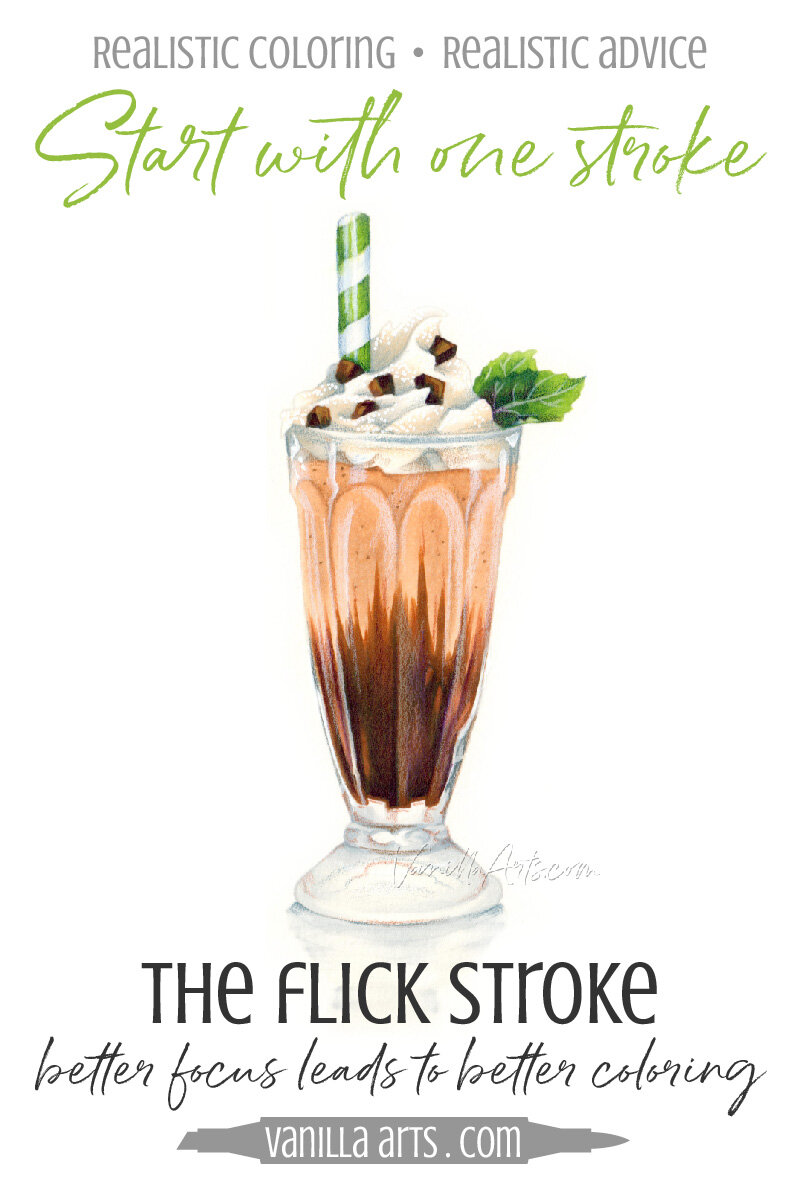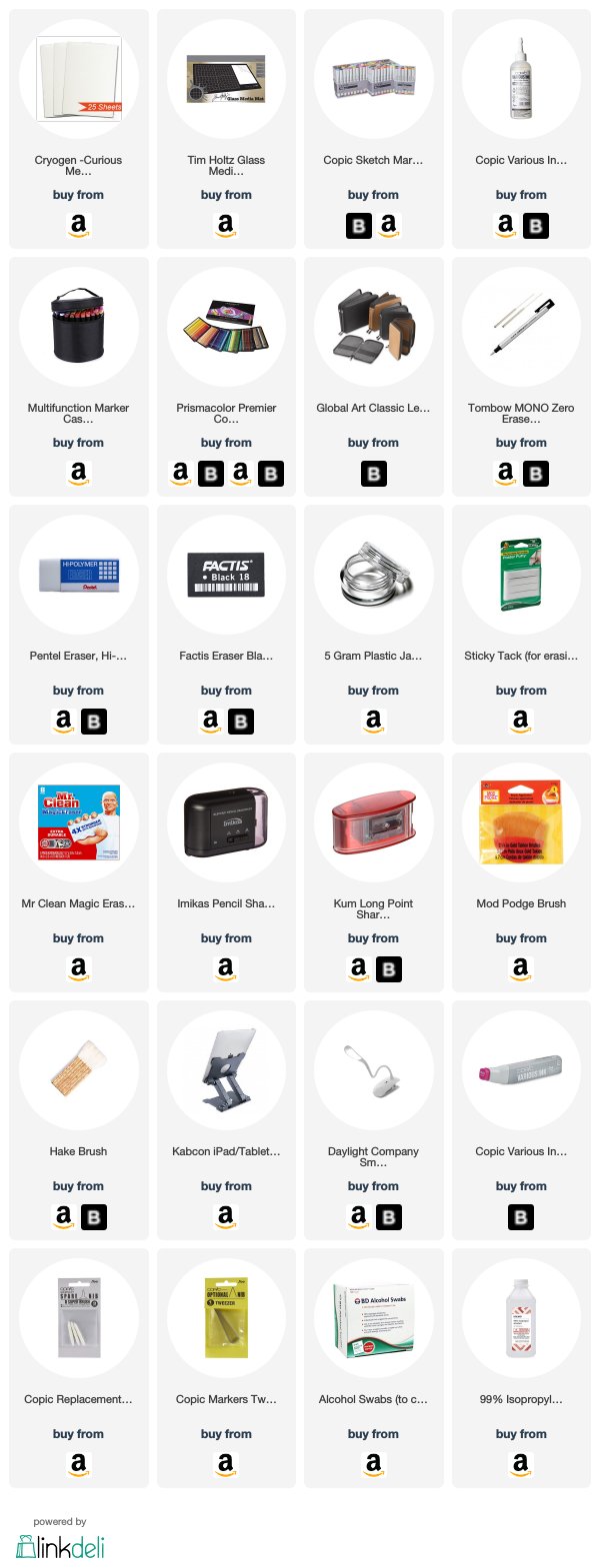The Flick Stroke: Better Coloring with Improved Technique (Copic Markers, Colored Pencils)
I want to color better!
It’s a simple wish.
I want to improve my coloring skills with Copic Markers or with colored pencils… maybe you’re even thinking about watercolor or mixed media advanced coloring.
You start out determined, with the best intentions.
This is the year I’m finally going to be an amazing colorer!
So you shop for stamp images. Lots of them. You’re going to color one new stamp every week. Or one big digital stamp project per month.
This is going to be soooooo good.
No.
No, it’s not.
Stop buying, stop planning. Just hold on for a second. Let’s pause and think.
How is this any different than what you’ve been doing?
You color one cute project after another. You buy all the markers and all the pencils from the recommended supply list. You watch the videos with a keen eye for where the marker nib touches the paper and exactly how many coats were used to blend it all…
And when you color, you’re in it with all your heart. You never go into a project thinking: Oh, I can’t wait! This is gonna be sooooo incredibly mediocre!
But this new plan?
Same as the old plan!
You’re still bouncing from cute project to cute project. You’re still hyper-analyzing all the info. Ain’t nothing really new here.
It doesn’t work. Stop doing this.
If you want to color better this year: get off the project merry-go-round!
Let’s focus on basic technique.
Because until you master the basic mechanics of coloring, you will never color better.
The Year of the Technique
We’re doing things different at Vanilla Arts Company.
You want to color better. We’re here to help you make it happen.
The right way.
Not by selling you a bunch of new project demos. Not by crankin’ out more pretty blending combinations or project recipes. Not by keeping your hands busy with cartoon projects that never engage your mind or your inner artist.
You’ve done all that. You know it doesn’t work.
This year, we’re building skills.
Let’s begin with the Flick Stroke
I can’t count how many times someone has handed me a Copic project and said something like:
Hey, I just finished this. What do you think? Does it look realistic and professional? What would you do different? But oh, please ignore the bottom corner where the blend doesn’t look right… and I know the middle section is way over-inked… and the top area is a little blotchy… and I definitely colored outside the lines right there…
Flick strokes people.
Flicking.
You know you’re supposed to use the Flick Stroke. Tons of tutorials mention flicking. You see instructors do it in videos while they’re talking about smoothness. Nine out of ten dentists recommend flicking.
You rarely see me pick up a Copic and not flick…
But you’re bound and determined to be the one amazing colorer in all of human history who can’t flick well?
Flicking is a basic, beginner, fundamental Copic Marker concept.
Until you master the flick, you will never improve your coloring.
A bold statement? Yes.
Coloring Basics: Flicking Fundamentals
I solemnly swear to focus on flick strokes— just the flicks and nothing more than the flicks.
Ready to deep dive?
Join Amy and Elena for a brand new series which takes the total egghead approach to coloring.
You can’t focus on learning a technique when you’re also thinking about how cute the puppy dog stamp is, how pretty the blending combination looks, whether the gel pen highlights on the dog’s eyes are symmetrical, what song is playing in the background, and what you’re having for dinner tonight.
Coloring Basics strips away the distractions.
Coloring Basics #1 concentrates on the mechanics of Flicking.
We’re breaking down the flick into its major components and detailing how to approach flicking for small, medium, and large scale Copic Marker projects.
Forget projects, we’re talking technique!
Amy and Elena don’t always do things the same way and they definitely don’t always agree. Get the scoop from two professional colorers— Amy is a BFA freelance technical illustrator, Elena is an experienced paper-crafter. Between the two approaches, you’ll find the method and process that works best for you.
Coloring Basics is an a la carte purchase from the Marker Painting Workshops which debuts in mid-January. Watch for more info coming soon.
Marker Painting Workshops
Classes/Courses which focus on the Flick Technique:
Classes which use flicking extensively:
Note that ALL Vanilla Arts marker classes use the flick stroke at some point. Shown here are those that rely especially upon flicks for effect.
Check out Amy’s favorite art supplies, click above.
The Flick Stroke is important
If you want to color better, if you plan on coloring larger, with greater realism or more artistry…
You can not do it without a great Flick Stroke.
Flick Strokes set the foundation for:
1. Better Copic Blends
Control your ink with flicking for smoother blending.
2. Directional Flow
Flick strokes lead the eye down flower petals, along rivers, across the sky.
3. Texture
Most textures start with a flick variation.
4. Artistic Fingerprints
You can tell a lot about what an artist is feeling or expressing by the kind of flick strokes they use and and how many flicks they leave exposed.
Join us in January as we master the Flick
We’re focusing on flicking technique in all our classes, across the website, and with the Vanilla Voice team.
It’s flicking month and we’re finally going to master this stuff so that we can do it automatically, without worry, every single time.
We can do this!
Let’s color a milkshake!
Join us for a fun Copic + Colored Pencil project.
Chocolate Milkshake is part of the Milkshake Trio digital stamp by Amy Shulke of Vanilla Arts Co.
Practice your flicking strokes first; then show off your new flicking skills on this realism challenge.
tight color sculpting flicks (whipped cream)
short feather blends (straw)
long feather blends (chocolate shake)
melting flicks (glass foot and reflection)
exposed long flicks (chocolate sauce)
exposed pencil flicks (glass highlights)
Select supplies used in Chocolate Milkshake:
Vanilla Arts Company is a participant in the Amazon Services LLC Associates Program, an affiliate advertising program designed to provide a means for use to earn fees by linking to Amazon.com.














